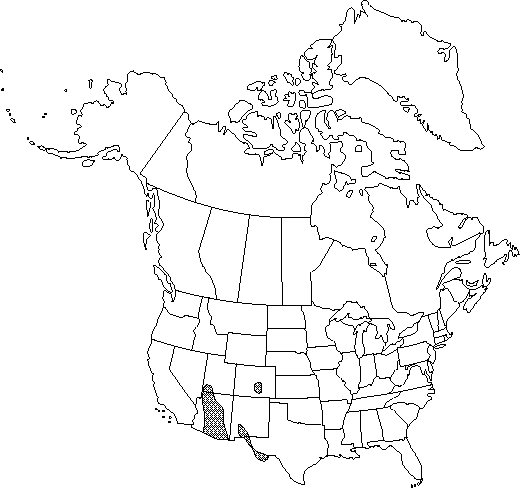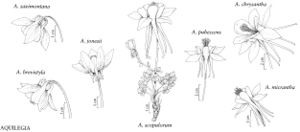Difference between revisions of "Aquilegia chrysantha"
Proc. Amer. Acad. Arts 8: 621. 1873.
FNA>Volume Importer |
FNA>Volume Importer |
||
| Line 23: | Line 23: | ||
}}<!-- | }}<!-- | ||
| − | --><span class="statement" id="st- | + | --><span class="statement" id="st-undefined" data-properties=""><b>Stems </b>30-120 cm. <b>Basal</b> leaves 2-3×-ternately compound, 9-45 cm, much shorter than stems; leaflets green adaxially, to 11-55 mm, not viscid; primary petiolules 20-50 mm (leaflets not crowded), glabrous or distally pilose. <b>Flowers</b> erect; sepals perpendicular to floral axis, yellow, lanceolate to ovate-lanceolate, 20-36 × 5-10 mm, apex narrowly acute or acuminate; petals: spurs yellow, straight, ± parallel or divergent, 42-65 mm, slender, evenly tapered from base, blades yellow, oblong, 13-23 × 6-15 mm; stamens 12-25 mm. <b>Follicles</b> 18-30 mm; beak 10-18 mm.</span><!-- |
-->{{Treatment/Body | -->{{Treatment/Body | ||
| Line 29: | Line 29: | ||
|habitat=Damp places in canyons | |habitat=Damp places in canyons | ||
|elevation=1000-3500 m | |elevation=1000-3500 m | ||
| − | |distribution=Ariz.;Colo.;N.Mex.;Tex.;Utah;nw Mexico | + | |distribution=Ariz.;Colo.;N.Mex.;Tex.;Utah;nw Mexico. |
|discussion=<p>Colorado populations supposedly having spurs only 35-40 mm have been called Aquilegia chrysantha var. rydbergii. Material seen from this area falls within the normal range of variation of the species. Populations intermediate between A. chrysantha and A. coerulea var. pinetorum occur in northern Arizona (M. Butterwick et al. 1991).</p> | |discussion=<p>Colorado populations supposedly having spurs only 35-40 mm have been called Aquilegia chrysantha var. rydbergii. Material seen from this area falls within the normal range of variation of the species. Populations intermediate between A. chrysantha and A. coerulea var. pinetorum occur in northern Arizona (M. Butterwick et al. 1991).</p> | ||
|tables= | |tables= | ||
| Line 49: | Line 49: | ||
|habitat=Damp places in canyons | |habitat=Damp places in canyons | ||
|elevation=1000-3500 m | |elevation=1000-3500 m | ||
| − | |distribution=Ariz.;Colo.;N.Mex.;Tex.;Utah;nw Mexico | + | |distribution=Ariz.;Colo.;N.Mex.;Tex.;Utah;nw Mexico. |
|reference=None | |reference=None | ||
|publication title=Proc. Amer. Acad. Arts | |publication title=Proc. Amer. Acad. Arts | ||
|publication year=1873 | |publication year=1873 | ||
|special status=Selected by author to be illustrated | |special status=Selected by author to be illustrated | ||
| − | |source xml=https://jpend@bitbucket.org/aafc-mbb/fna- | + | |source xml=https://jpend@bitbucket.org/aafc-mbb/fna-data-curation.git/src/9216fc802291cd3df363fd52122300479582ede7/coarse_grained_fna_xml/V3/V3_552.xml |
|genus=Aquilegia | |genus=Aquilegia | ||
|species=Aquilegia chrysantha | |species=Aquilegia chrysantha | ||
| − | |||
| − | |||
| − | |||
| − | |||
| − | |||
| − | |||
| − | |||
| − | |||
| − | |||
| − | |||
| − | |||
| − | |||
| − | |||
| − | |||
| − | |||
| − | |||
| − | |||
| − | |||
| − | |||
| − | |||
| − | |||
| − | |||
| − | |||
| − | |||
| − | |||
| − | |||
| − | |||
| − | |||
| − | |||
}}<!-- | }}<!-- | ||
-->[[Category:Treatment]][[Category:Aquilegia]] | -->[[Category:Treatment]][[Category:Aquilegia]] | ||
Revision as of 13:43, 27 July 2019
Stems 30-120 cm. Basal leaves 2-3×-ternately compound, 9-45 cm, much shorter than stems; leaflets green adaxially, to 11-55 mm, not viscid; primary petiolules 20-50 mm (leaflets not crowded), glabrous or distally pilose. Flowers erect; sepals perpendicular to floral axis, yellow, lanceolate to ovate-lanceolate, 20-36 × 5-10 mm, apex narrowly acute or acuminate; petals: spurs yellow, straight, ± parallel or divergent, 42-65 mm, slender, evenly tapered from base, blades yellow, oblong, 13-23 × 6-15 mm; stamens 12-25 mm. Follicles 18-30 mm; beak 10-18 mm.
Phenology: Flowering spring–summer (Apr–Sep).
Habitat: Damp places in canyons
Elevation: 1000-3500 m
Distribution

Ariz., Colo., N.Mex., Tex., Utah, nw Mexico.
Discussion
Colorado populations supposedly having spurs only 35-40 mm have been called Aquilegia chrysantha var. rydbergii. Material seen from this area falls within the normal range of variation of the species. Populations intermediate between A. chrysantha and A. coerulea var. pinetorum occur in northern Arizona (M. Butterwick et al. 1991).
Selected References
None.
